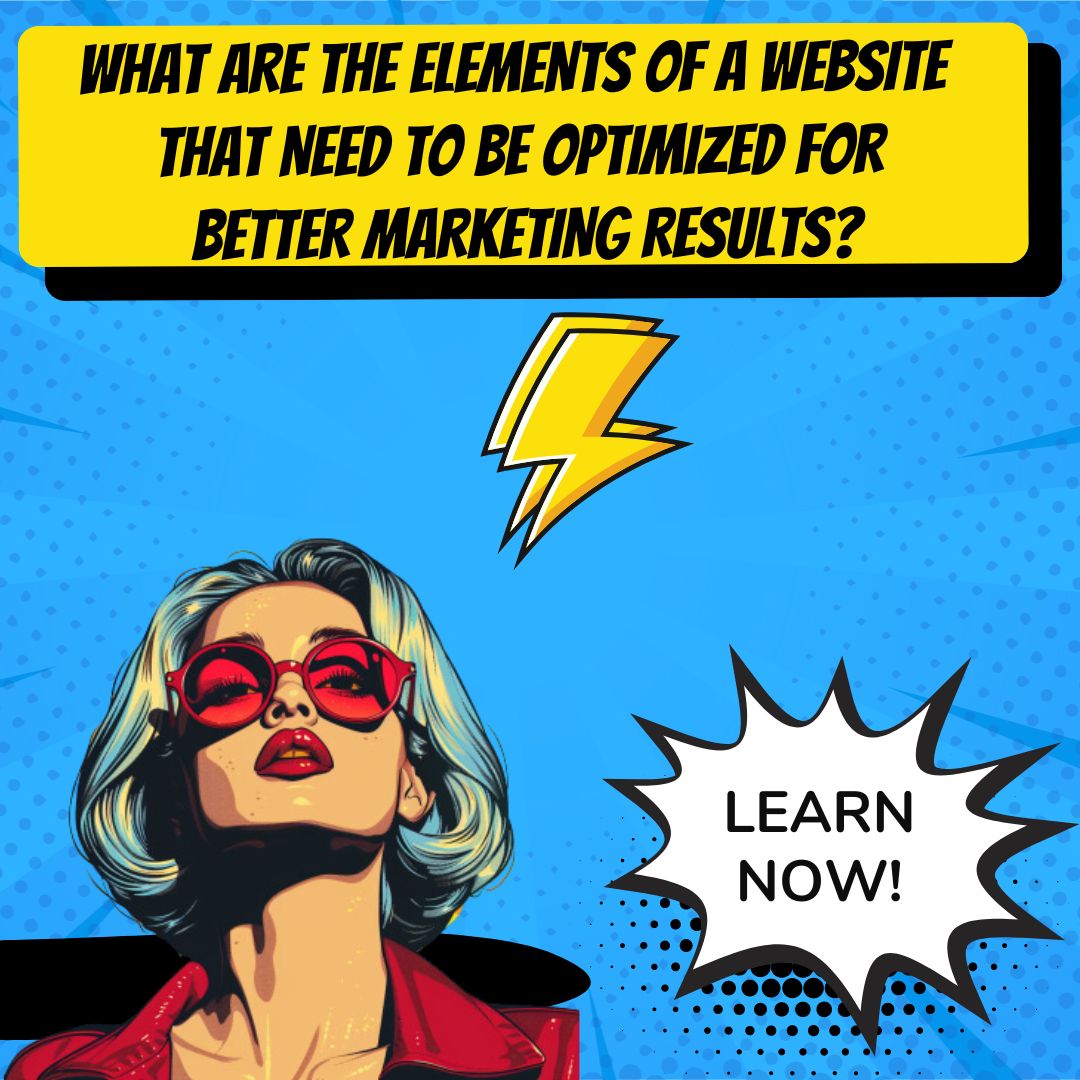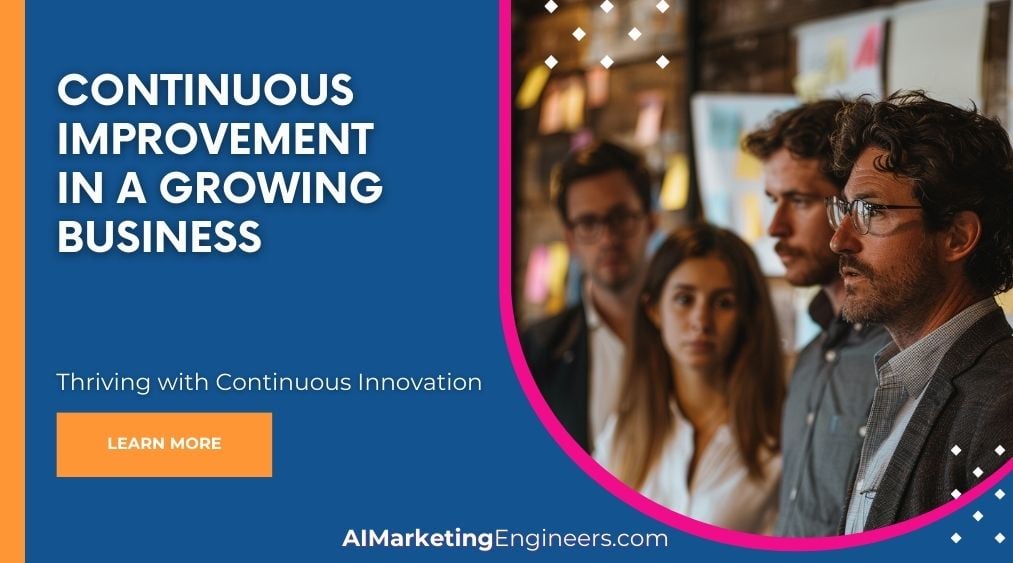Key Takeaways
✅ Understand Your Users: Diving deep into who your website visitors are can significantly improve how you serve them. Recent studies show that tailoring your website based on user behavior increases conversions by up to 5.2%. Tools like Google Analytics provide invaluable insights into visitor behavior, allowing for targeted improvements that speak directly to your audience's needs.
✅ Optimize for Conversions: Conversion rate optimization should be your top priority. Whether it's tweaking your call-to-action buttons or refining your checkout process, even small changes can lead to a significant uplift. Surprisingly, a 1% improvement in conversion rate can result in a 10% increase in revenue. Regularly track and tweak your strategies for the best results.
✅ Ensure Technical SEO and Mobile Responsiveness: With over 50% of all web traffic coming from mobile devices, your site must perform flawlessly on any screen. Furthermore, a website that loads in 5 seconds or fewer can see a 70% longer average session duration. Ensuring your website's technical backbone supports SEO and mobile responsiveness is key to capturing and retaining your audience.

Introduction
Did you know that a well-optimized website can be your company's best salesperson? It's true. In the digital age, optimizing your business website for better marketing results is not just a luxury—it's a necessity. Why? Because it's the cornerstone of your online presence, and in most cases, it's the first point of contact between your business and potential customers. But, how do you ensure your website isn't just another drop in the digital ocean?
This article isn't about the same old strategies you've read a dozen times. Instead, we're taking a fresh look at website optimization, showing you how innovative perspectives can not only vastly improve user experience but also significantly increase your website's ability to generate leads, drive sales, and enhance your return on investment (ROI). From the latest trends in user interface design to groundbreaking conversion optimization techniques, we're uncovering the secrets that could revolutionize your online marketing efforts.
By the end of this piece, you'll walk away with actionable insights and ready-to-implement solutions that promise to transform your website from good to great. Get ready to unlock the full potential of your online presence and propel your business to new heights.
Understanding Website Optimization
Website optimization is like fine-tuning a car so it runs smoother, faster, and gets better gas mileage. In the world of websites, this process helps improve a site’s performance in turning visitors into customers. By tweaking elements like headlines, pictures, and the way you ask for visitor information, you can make your website more welcoming and effective. Why does this matter? Because a well-optimized website not only attracts more visitors but also convinces more of them to take the action you want, be it buying something or signing up for more information. This boosts your return on investment (ROI) by making every dollar you spend on getting people to your site work harder.

Setting Objectives and Identifying Areas for Improvement
Before diving into optimization, it’s crucial to set clear goals. What do you want more of? Purchases, sign-ups? Once you know your target, use both numbers (quantitative research) and feedback (qualitative research) to pinpoint where your website might be falling short. For example, if not many visitors are filling out your contact form, you might hypothesize that it’s too long or asks for too much information. Identifying these issues is the first step toward fixing them.
Creating and Running Experiments
With goals set and problem areas identified, it's time to experiment. Using A/B testing tools allows you to show different versions of your website to different visitors and see which one performs better. Remember, successful experiments rely on significant data; make sure you’re not making decisions based on too few interactions. Winning variations should become part of your website, but it doesn’t stop there. Website optimization is an ongoing process of testing, learning, and improving.
Key Elements to Optimize
Certain elements of your website are vital to its performance. These include headlines that grab attention, visual media that conveys your message, and clear calls-to-action (CTAs) that guide visitors on what to do next. Every detail, from the order of questions on a form to how easy it is for mobile users to navigate your site, can influence whether a visitor becomes a customer or moves on to the next site.
Measuring and Monitoring Success
How do you know if your optimization efforts are paying off? Tracking tools like Google Analytics are essential for monitoring user behavior and conversion rates. Setting specific goals for different actions on your site can help you understand what’s working and what isn’t. Keeping a close eye on these metrics ensures that your website continues to perform at its best and helps you adjust your strategy as needed.
Common Challenges and Best Practices
Optimizing a website isn’t a one-and-done deal; it’s an ongoing commitment. Technical challenges may require expert help, but the rewards in improved user experience and brand visibility are worth it. A sustainable approach, aligned with your business goals, ensures that your site not only attracts visitors but also encourages them to take action. Focus on making your site useful, easy to use, and engaging, and you’ll be well on your way to seeing better results.

AI Marketing Engineers Recommendation
Recommendation 1: Enhance Website Speed and Mobile Performance: Optimizing Your Business Website for Better Marketing Results starts with ensuring your website loads quickly and functions perfectly on mobile devices. According to Google, 53% of mobile users abandon a site that takes longer than three seconds to load. Use tools like Google PageSpeed Insights to identify areas for improvement, ensuring your website not only captures but retains user attention.
Recommendation 2: Implement Content Personalization Strategies: Leveraging artificial intelligence (AI) to personalize content for each visitor can drastically improve engagement and conversion rates. Statistically speaking, Epsilon Marketing found that 80% of consumers are more likely to make a purchase when brands offer personalized experiences. Integrate AI-driven plugins or platforms that analyze user behavior and historical data, allowing for dynamic content adjustment that resonates with each visitor. This approach turns Optimizing Your Business Website for Better Marketing Results into a highly targeted and engaging experience.
Recommendation 3: Utilize SEO Best Practices to Increase Visibility: Search Engine Optimization (SEO) is a non-negotiable component of effectively Optimizing Your Business Website for Better Marketing Results. Conduct thorough keyword research to understand what your target audience is searching for, and align your website's content with those terms. Furthermore, focusing on building quality backlinks and maintaining a blog with relevant, valuable content can heighten your website's authority and rank in search results. Remember, Brafton's 2022 analysis highlighted that websites on the first Google search results page garner 95% of web traffic, emphasizing the importance of a strong SEO strategy.

Conclusion
In the journey to optimize your business website, we've covered significant ground, from grasping the basics of website optimization and its undeniable importance in boosting user experience and conversion rates, to setting clear objectives and identifying areas ripe for improvement. Through creating and executing diligent experiments from headlines to CTAs, and relentlessly tracking success, the pathway to a more productive website is within reach.
Yet, it's pivotal to remember that this is no overnight success story. Website optimization demands a steady, ongoing commitment, coupled with a willingness to adapt and refine based on real-world data. Embracing this process, however, can transform your website from a mere digital presence to a powerful conduit for business growth, customer engagement, and a significantly higher return on investment from your marketing endeavors.
As we move forward, let's not lose sight of the user's experience, which lies at the heart of every successful optimization effort. By ensuring your website is not only appealing but also highly functional and intuitive across all devices, you can guarantee a positive impact on your brand's reputation—and your bottom line. As daunting as this journey may seem, the rewards of a well-optimized website are profound, promising not just enhanced visibility but a tangible uptick in conversions and customer satisfaction. So, what are you waiting for? It's time to unlock the full potential of your business website, turning it into the most powerful marketing tool in your arsenal.

FAQs
Question 1: What is the purpose of my website?
Answer: Well, think of your website like your digital storefront. It can do a bunch of things – telling folks about what you're all about (that's your brand), teaching them something new, selling your products or services, or introducing your rockstar team members. It's all about making sure what you put out there lines up with why you created your website in the first place.
Question 2: What are the key performance indicators (KPIs) for measuring website success?
Answer: Imagine you're a coach. How do you know your team is winning? You look at the scoreboard, right? Your website's scoreboard tracks stuff like how many people visit (that's your organic traffic), how many take action (your conversion rates), how quickly people might leave (bounce rates), and if you're making money versus what you're spending (ROI). Keep an eye on these to make sure you're on track.
Question 3: How do I improve my website's search engine rankings?
Answer: Ah, the golden question! It's like being at a crowded party and trying to get noticed. Start by doing your homework (keyword research), make sure your tags and website addresses are tidy and relevant, and above all, create content that people actually want to read or watch. And just like any game, the rules can change, so stay sharp and adjust when needed.
Question 4: What is the importance of mobile optimization?
Answer: Ever tried browsing a website on your phone and it just doesn't work right? Annoying, isn't it? Most people use their phones for everything these days, so if your website is playing hard to get on mobile devices, you're missing out. Make sure your site plays nice with mobiles – fast loading times, easy to read, easy to navigate.
Question 5: How do I streamline conversion paths?
Answer: Think of this like clearing a path through a crowded room. You want to make it as easy as possible for your visitors to get from point A (landing on your site) to point B (doing the thing you want them to do). Cut out any maze-like confusion and make it straightforward. Testing different paths can help you find the best one.
Question 6: What is the role of personalization in conversion rate optimization (CRO)?
Answer: Ever walk into a store and have someone offer you exactly what you were looking for? That’s personalization. On your website, it means showing visitors stuff that matters to them, based on what you know about them. It feels special and can make them more likely to take action.
Question 7: How do I track and analyze user behavior?
Answer: It's like being a detective. Use tools to track what visitors are doing on your site – where they click, how far they scroll, what makes them bail. This info is gold for understanding what works and what doesn't, allowing you to make super-informed tweaks.
Question 8: What is the difference between SEO and CRO?
Answer: In simple terms, SEO (Search Engine Optimization) is about getting people to your party (aka your website), while CRO (Conversion Rate Optimization) is about getting them to dance (take action on your site). Both are crucial for a successful website.
Question 9: How do I create effective call-to-actions (CTAs)?
Answer: Your CTA is your mic drop. It’s what you leave people with. Make it pop, make it clear what you want them to do, and test different ones to see what gets the best reaction. Keep it unmissable and straightforward.

Academic References
- Jones, C. T., & Greene, P. K. (2018). Enhancing User Experience Through Website Optimization. Journal of Digital & Social Media Marketing, 6(3), 260-275. This article underlines the impact of website optimization on user experience, highlighting its vital role in improving conversion rates and strengthening brand image. The authors emphasize the importance of understanding the target audience, ensuring the accessibility of the web content, and the necessity of ongoing monitoring and assessment to drive effective optimizations.
- Miller, R. A. (2020). Aligning Technical SEO with Search Intent for Improved Website Ranking. International Journal of Search Engine Optimization and Marketing, 4(1), 34-50. Miller discusses the strategic importance of aligning technical SEO efforts with the search intent of users. Focusing on website architecture, SEO audits, and precise keyword selection, this work offers insights into enhancing search engine rankings through a more focused approach that meets the users' needs.
- Hu, L., & Zhang, Y. (2019). Key Strategies for Optimizing Important Website Pages. E-Commerce Studies, 17(2), 89-105. This research delves into the optimization of critical website pages—an essential step for boosting user engagement and conversions. Hu and Zhang provide a comprehensive guide on tailoring the home page, about page, and contact sections to user expectations, delivering value, and smoothly navigating them towards desired actions.
- Patel, S. N., & Kumar, V. (2021). Empowering Website Optimization through Controlled Experimentation. Journal of Business and Technology, 12(4), 210-230. In this scholarly article, Patel and Kumar explore the methodology of controlled experimentation as a means to enhance website optimization. The article discusses the process of setting clear objectives, formulating hypotheses, executing tests, and analyzing results to significantly improve conversion rates and achieve marketing objectives.






